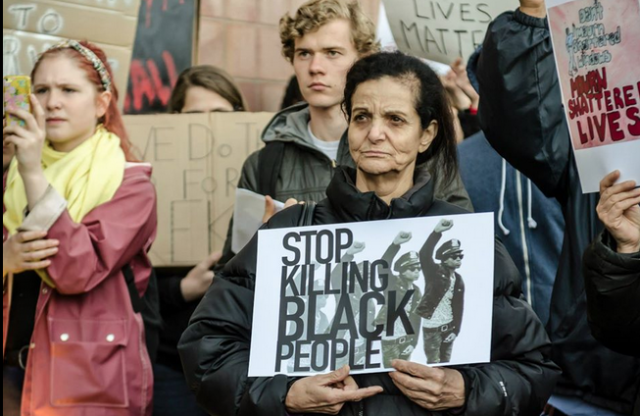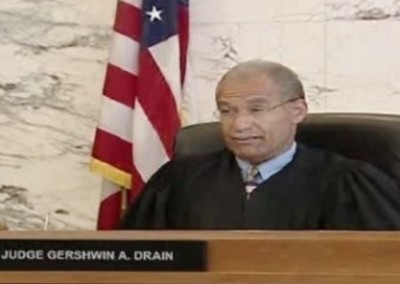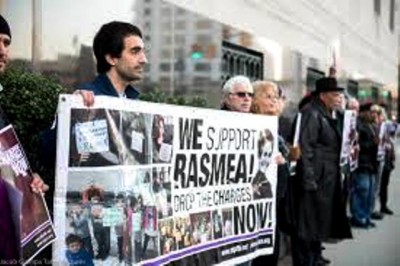
Rasmea Odeh, a long-time activist in Chicago after her immigration to the U.S, participates in protest against killings by U.S. police.
Court unanimously says U.S. Detroit Judge Gershwin Drain erred in refusing to allow testimony about Odeh’s torture, rape by Israeli military
 The Electronic Intifada
The Electronic Intifada
February 25, 2016
A US court of appeals vacated the conviction of Palestinian American activist Rasmea Odeh on Thursday, returning her case to the district judge for a possible retrial.

U.S. District Court Judge Gershwin Drain
In November 2014, Odeh, 68, was convicted of immigration fraud for failing to disclose her 1969 arrest and conviction by the Israeli military on her immigration and naturalization documents filed respectively in 1994 and 2005.
Her lawyers appealed her conviction on the basis that US District Judge Gershwin Drain had denied Odeh the opportunity to present a complete defense by prohibiting her from speaking about the torture and abuse she endured that led to her signing a false confession in 1969.
Drain refused to allow Odeh to call Mary Fabri, an expert on torture, who had submitted an affidavit for the defense stating that that Odeh suffered from post-traumatic stress disorder (PTSD) from her torture, including rape, by Israeli interrogators.
Torture testimony
Fabri testified that Odeh’s PTSD may have affected her state of mind when she failed to disclose her military court conviction on her citizenship application.

Protest at U.S. District Court in Detroit during Rasmea’s trial.
The panel of three justices reviewed Fabri’s testimony and unanimously agreed that the trial judge erred on his basis for excluding it from Odeh’s trial.
Judge Drain had barred it on the basis that Odeh was charged with a “general intent” crime rather than a “specific intent” crime – a legal distinction he held would make her state of mind irrelevant to the case.
“Regardless of whether [it] was a specific or general intent crime,” the ruling states, “Dr. Fabri’s proffered testimony is relevant to whether Odeh knew that her statements were false.”
Now Judge Drain must determine if there is another basis on which to exclude the expert testimony. Failing that, Odeh will be allowed to have a new a trial with the expert testimony.

Attorney Michael Deutsch with Rasmea Odeh.
“I feel confident she will get a new trial,” Michael Deutsch, Odeh’s lead attorney, told The Electronic Intifada.
“I don’t see another reasonable reason to exclude the expert testimony.”
Deutsch called the appellate court’s ruling a “a great victory.”
The Rasmea Defense Committee is calling today’s decision a “partial victory.”
“The conviction wasn’t overturned altogether, but at least Judge Drain will be forced to rethink his decision on the torture evidence,” Nesreen Hasan said in a press release.
The Center for Constitutional Rights had filed a brief supporting Odeh’s appeal, on behalf of five organizations with expertise on the impact of torture, including the International Rehabilitation Council for Torture Victims, Bellevue/NYU Program For Survivors of Torture, Public Committee Against Torture In Israel, REDRESS and the World Organization Against Torture.
Prejudicial material

The Israeli military has been exposed for its rampant beatings and torture of Palestinian children.
Odeh’s defense had also argued that the government should not have been permitted to use Israeli military court documents during Odeh’s trial.
The documents included the Israeli military’s indictment against Odeh.
In 1969, Odeh was convicted of helping coordinate two bombings in West Jerusalem that caused the death of two civilians.
Odeh maintained that the conviction by an Israeli military court was the result of her prolonged torture.
Her defense argued that these details were prejudicial in a trial that was concerned with alleged immigration fraud, not her decades-old conviction.
One of the justices in the appellate court agreed that those details should have been excluded.
Attorney Deutsch told The Electronic Intifada that if there is a retrial, Odeh’s defense will argue again that those military court documents should be left out of the courtroom.
Related from VOD:




